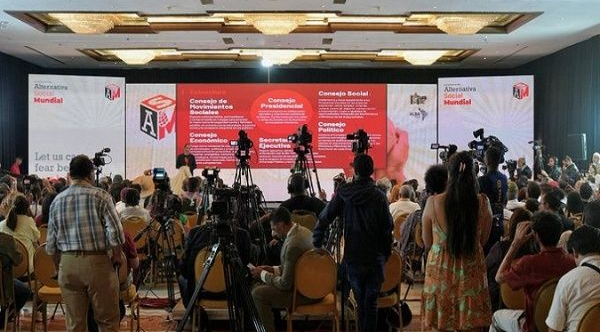
Caracas, April 20 (RHC)-- The second day of the Meeting for a World Social Alternative took place in Caracas, Venezuela on Friday, with the presence of about 500 participants from some 60 countries.
The meeting, sponsored by the Bolivarian Alliance for the Peoples of Our America-People's Trade Agreement (ALBA-TCP) and Venezuela's Simon Bolivar Institute, ends on Saturday. Participants during the three-day meeting discussed continental unity and the construction of a common agenda against imperialism.
The program on Friday included the conference "The principle of unity as a transforming element," by the executive secretary of the integrationist bloc, Jorge Arreaza, as well as the conference on "Hyper-imperialism and a World Social Alternative," by the Indian intellectual Vijay Prashad, of the Tricontinental Institute of Social Research.
The meeting also expressed solidarity with Palestine, Cuba, Haiti and former Ecuadorian vice-president Jorge Glas, in which former presidents Rafael Correa (Ecuador, 2007-2017), Manuel Zelaya (Honduras, 2006-2009) and Evo Morales (Bolivia, 2006-2019) addressed the gathering. Venezuelan diplomat Alex Saab, who suffered torture and humiliation during his illegal kidnapping for 40 months, part of that time in the U.S., also participated.
Jorge Arreaza said at the opening of the forum that the meeting aims at reaching a minimum agreement for action, a minimum agenda for action, as well as a diagnosis of the decadence and dangers of imperialism.
During the meeting, a document was discussed which incorporates proposals from the social movements on issues such as education, health and housing, among others. It is expected to be presented next week before the Summit of Presidents and Prime Ministers of ALBA-TCP.
On the occasion, there was consensus on the urgency of continuing to promote multilateralism in the face of the attempt by hegemonic countries to stimulate confrontation, and the change from the current world order based on respect for the United Nations Charter to one based on rules defined at their convenience.
The definition of strategies of struggle was also linked to communication and popular mobilization to spread solidarity and cooperation in support of a more just world order.

